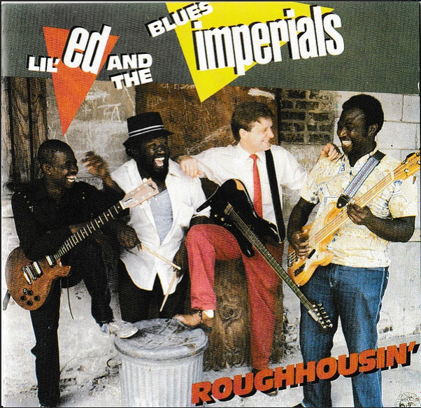Essential Blues Recording
Lil’ Ed And The Blues Imperials – Supremely Carrying The Blues Slide Guitar Legacy Forward
Lil’ Ed And The Blues Imperials – Roughhousin’ – Alligator Records ALCD 4749
Often, blues recording critics get tangled in their own heads attempting to excavate too deeply into the subtleties of a collection, mining for significance, structural nuances, inspirations, and ranking in the whole recorded legacy of the musical category, rather than just sitting back and completely relishing in the journey of an outing. I am, at times, guilty as charged!
From the instant I heard Lil’ Ed’s “Young Thing” on Alligator Records’ The New Bluebloods (The Next Generation Of Chicago Blues), I was captivated. Here was the modern-day embodiment of countless of the Chicago bluesmen whose slide guitar designs so spellbound me for years, primarily Johnny Littlejohn, Elmore James, and J.B. Hutto (who, by the way, was Lil’ Ed’s uncle), regenerating the convention of a blues style that is now rather lost in the masses of blues guitar artists who cherish their visions more within the framework of B.B. King’s single-string soloing flair.
The story goes that as Ed and his band played together in Chicago’s dingy west side joints, their audiences were often comprised of the same patrons who once appreciated the same take-no-prisoners approach as Chicago blues legends Elmore James, Hound Dog Taylor, Howlin’ Wolf, and J.B. Hutto, to name but a few giants who also were intensely passionate on the bandstand. Without a doubt, the very soul of Hutto was with Ed and his band every time they performed, as he never forgot the lessons learned at his uncle’s feet.
Whether Ed was falling to his knees during a solo, bending backwards to touch the stage with his head (complete with a fez), or perhaps riding the shoulder of his bandmate, maybe duck walking a la Chuck Berry, there he always was with that ear-to-ear broad grin, endearingly smiling. With his slide securely jammed on his finger, he wrung enthralling cascades of blues notes from his screaming guitar. And ultimately it paid off, as in 1984 the band broke on the highly competitive Chicago blues scene, being invited to the inaugural Chicago Blues Festival, playing on the city’s north side busy club scene, and touring to Canadian blues festivals.
Lil’ Ed And The Blues Imperials were brought into the studio to lay down a few selections for Alligator Records’ aforementioned The New Bluebloods (The Next Generation Of Chicago Blues) anthology. The band had zero experience in a recording environment yet, when they plugged in and let loose, tough, insistent blues songs just kept coming. Something was happening.
To make a long story short, by the end of the session, 30, yes 30, blues were recorded, and ten of them made the cut to be on Roughhousin’. It was an epic happening that launched the phenomenon that remains Lil’ Ed And The Blues Imperials, one that positively personifies Alligator Records’ “Genuine Houserockin’ Music” mantra.
With Pookie Young forging encasing low-end bass formats, Dave Weld constructing counter-point rhythm guitar patterns to Ed’s slide forays, and Louis Henderson providing a granite-solid percussion backdrop, this collection is riotous and turbulent beyond measure, and thank goodness for that! It is as if Ed and his band were in their element in one of Chicago’s tattered blues haunts on one of those special nights when everything is cooking hot, but in this case, the tapes were rolling instead.
Blues slide guitar can squeeze affecting sentiments out of the apparatus’ six strings, advance a partition of bluster, and provide a rush of celebratory sound. Ed undoubtedly remains a torchbearer for those great blues slide guitar benefits. Here, he takes maximum domination of his guitar and attains each conceivable level of emotional yield, gashing and propelling when essential for the required power, and then doubling-down to hunt and pursue for every drop of moving implication necessary. It is all blues art at its best. And, it represents modern-day blues, in 1986, as it needed to be, in that as the music was beginning to change. There was a need to both carry the best of the Chicago blues slide guitar heritage forward to a new audience. This was of paramount importance for a new generation of fans just discovering the music. For that reason, this collection is indispensable.
This CD belongs on the shelves of every blues collection. It is a contemporary blues masterwork.
Essential blues right here!
